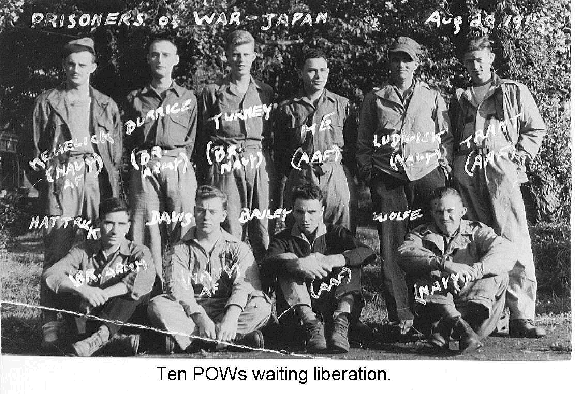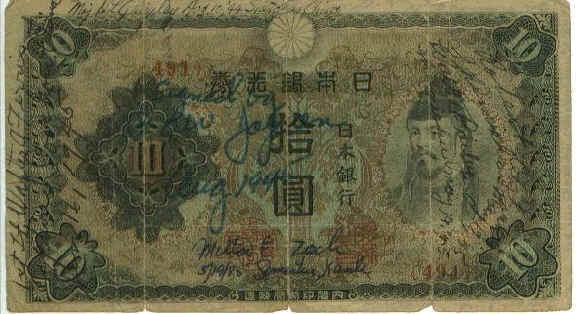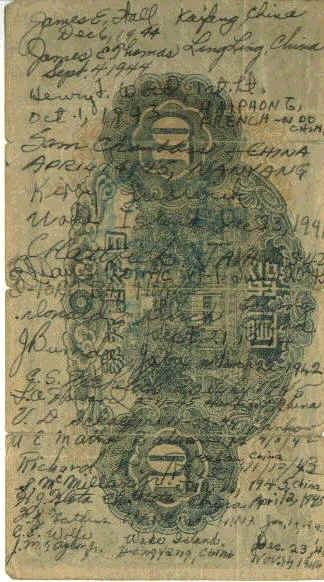
Note: Milt's Memoirs are published here with the kind permission of Mr. Zack. The views expressed in the story are those of the Author. [The Webmaster]
Miltís Military
Memoirs
Part V
WAITING FOR LIBERATION
We were marking time waiting for the American troops to come and liberate us and arrange whatever they had to in order to get us home. One evening we heard what sounded like a shot being fired into the room. Someone yelled "Hit the deck!" and you never saw ten guys hit the floor so fast, and try to dig a hole with their fingernails. The guard took off, and one of us, I donít remember who, crawled out after him and got his rifle. He brought it back into the room and we discovered it had no ammunition. There were no more shots and we calmed down somewhat, but we were still a bit edgy all evening. We thought it might have been a disgruntled soldier who saw us through the window and wanted to get even with the Americans.
The next day a Japanese colonel came into the room and introduced himself. He told us that two Japanese cities, Hiroshima and Nagasaki, had been wiped out by a single bomb dropped into each city. We told him we thought he was full of it, because no bomb existed that could have done that and we told him that Japan had surrendered because they were losing the war. For some inexplicable reason this prompted him to start telling us, in imperfect English, about several Japanese customs. One of these was that if the man of the house didnít want to be disturbed and a visitor from outside arrived, the lady of the house would tell the visitor he was not at home, even if the visitor could see the man from the door. This was not considered an insult by the visitor, apparently it was simply the most polite way of saying he didnít want visitors and everyone did it. Another strange custom was one practiced in the army. Every soldier carried with him a booklet in which was entered any infraction, large or small, incurred during his service. This booklet was very important because any prospective employer would ask to look at it and use it to judge the manís employability. However, a minor infraction could be kept from being entered if, instead, the soldier was beaten by someone of higher rank. One day some time later we were all outside near a parade ground where the Japanese were playing baseball. Suddenly one soldier started beating a subordinate to the ground, and we guessed an infraction had been made and the beating was substituting the written entry. He also told us others which I have forgotten, and to this day I have no idea why he related all of this to us. If it was to emphasize the differences in our cultures, it was unnecessary. We were all too aware of that already.
We asked the colonel if there were any more American POWs being held in the camp where we were, but he sort of hemmed and hawed and didnít really give us an answer. However, the next day we were taken out and brought to two larger rooms in the camp where there were 12 American pilots who had been shot down in China. I stayed in the same room as my two crewmen so we could be together as I felt responsible for them, and there was also the Navy Ensign and other enlisted men in the same room. One of the pilots in this new group was a Major who had assumed charge of all the men, and when he found the Ensign and I were staying with enlisted men, he ordered us to join the officers in the other room.
While we were there the Japanese started bringing in food several times a day and also brought in a brazier so we could heat some food. They even gave us some sake. The major would ask every Japanese officer that came in when we would be leaving the camp. They kept telling him that the Americans had not landed on Hokkaido yet, but that a big PW had been painted on the roof of each building so they would know we were there when they did arrive.
We were outside one day when we heard the roar of an airplane engine, and suddenly above us appeared a B29 flying not more than 200ft-300ft off the ground. We all jumped up and waved our hands and yelled, even though we knew they couldnít hear us. Then one of our guys said he saw something fall out or get thrown out of the plane, and ran out to where he saw it land. He came back with a map that had been tied to a wrench. On the map had been written "We know you are there and we will be back soon." I donít know how they got the note on the map so quickly. One of the British soldiers looked at us Americans and said "You bloody Americans. I remember that you all bragged and bragged about everything, and now I can believe everything you told me after seeing that plane."
We told the Japanese that we wanted to go into the nearest town, I donít remember why exactly, more just for something to do I guess. For some reason they agreed to take us and gave us all some money, which we of course didnít have, and sent us off in a truck with some soldiers with rifles. It wasnít much of a town and there was very little to buy, but we wandered in and out of the stores anyway, enjoying the freedom.
Shortly after that we were told that American planes had dropped supplies about 10-20 miles away, and that they would send a truck to take some of us out to pick them up. When the truck came back we unloaded it and found food, clothing, medical supplies and 128 pairs of shoes, about 100 pairs more than we needed. We lined the shoes up and took what we wanted, then the Japanese would come in and out to admire the leather. They hadnít seen good leather in a long time. Of course, the best thing they dropped were cigarettes. The food was K and C rations, which were field rations that the soldiers hated, but to us it was the best thing we had ever tasted. One of the men became chief cook and would mix things up so we had several hot meals.
An interpreter came in one day and said he would like to take some pictures. He first took pictures of the original group of 10, then the 12 pilots and finally the entire group. In the meantime, several Japanese squeezed into the shots so they wound up looking like a happy group of friends. The roll of film was given to one of the prisoners, who had it developed and sent copies to all of us after we arrived home. At the same time I had a piece of Japanese paper money and I asked everyone there to sign it with dates and places of capture. I still have it.



Milt's War - Index
|
Chapter 1 |
| The Cadet |
| Enlisting |
| Classification |
| Preflight Training |
| Aerial Gunner |
|
Chapter 2 |
|
Chapter 3 |
| Getting There |
| Getting Settled |
| Getting Into It |
| Getting Captured |
|
Chapter 4 |
| Prisoner of War |
| Temporary Quarters |
| A New Home |
|
Chapter 5 |
| The Beginning of The End |
| War Stories |
| Waiting for Liberation |
| Heading Home |
|
To Be Continued |
Always looking for Material and Scans of the 11th Air Force and Associated Units to add to this site.